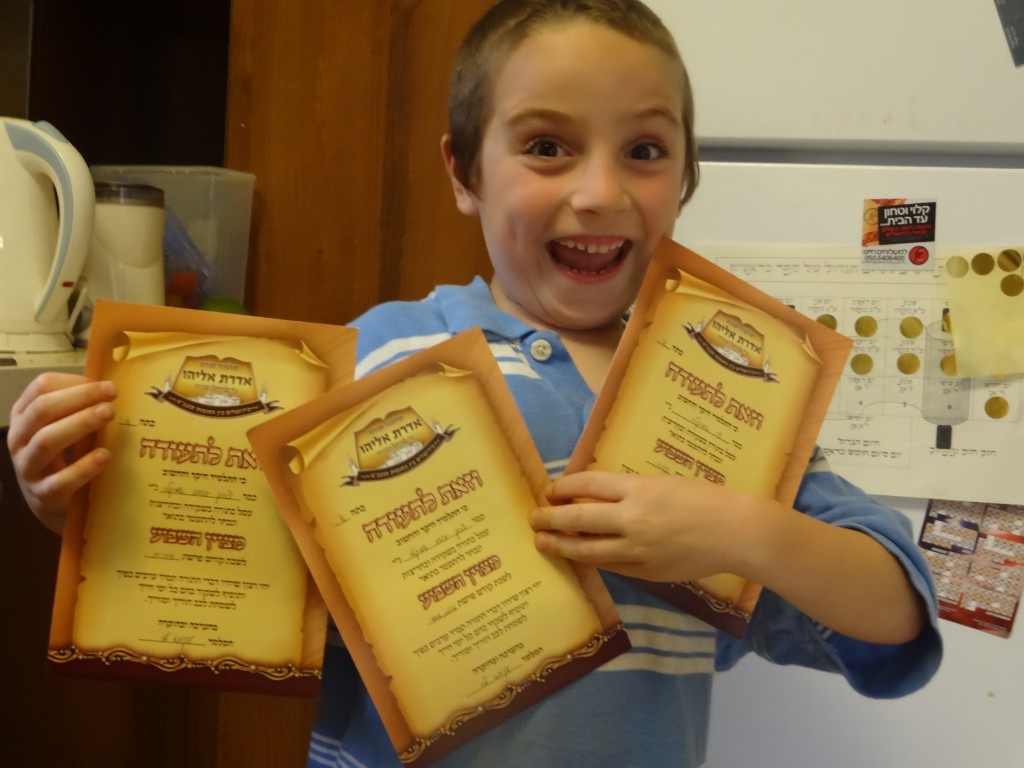Everyone told us that kids pick up Hebrew fast, and that it would be no big deal for them to be in a Hebrew-only school environment this year. Needless to say, it isn’t quite so simple.
Yitzi goes to Talmud Torah Aderet Eliyahu (nice promotional video here), a.k.a. Zilberman’s. There are a number of unique things about the school. It is famous for its methodology (the boys learn all of Tanach (Bible) by heart, then learn Mishna, and only then Gemara) and for the fact that they have school 364 days a year. The only day off is Tisha B’Av, when it is actually prohibited to learn (most) Torah. Even on Shabbos they have at least a few hours of school.
But the most immediately significant fact for Yitzi was that his Rebbe speaks no English, although there are a few English-speaking kids in his class. Also, we put him back in Kita Aleph (first grade), even though he’d be in second grade in Chicago, so he was familiar with the first few parshiyos (portions) they did in Chumash (written Torah) at the beginning of the year. But much of the time he simply didn’t understand what was going on.
Putting Yitzi in Kita Aleph was the right move for another reason. His birthday is at the end of October, right near the cutoff for school years. In Chicago, we wound up putting him in the older class (i.e., he’s among the youngest), which worked out fine because it’s a class of great kids. Here, he was among the oldest, which helped him get through the physical hazing of being the new kid. The kids here aren’t really mean, but they are tough, and they don’t hesitate to get rough with each other. Fortunately, Yitzi seemed able to defend himself, and wasn’t fazed by it. Part of it is that somewhere he got the idea that he knows some karate. Yeah, I have no idea. In fact, one day he came home and announced, “Mommy, I love fighting.” Their “fighting” is mostly little-boy wrestling, so it’s no big deal, but we are frequently reminding him that it is ok to defend yourself, but he’s not to initiate physicality, especially when we get back to Chicago.
I was really impressed by Yitzi’s approach this year. He never got discouraged, and went to school every day eager to learn, even when he didn’t know what was being said. In an early meeting I had with his rebbe (via a translator), he referred to Yitzi as a malach (angel), because he was always attentive and trying to follow along. Once, he had as a sub the second grade rebbe, who does speak English. Yitzi remarked wistfully that it would’ve been nice to be in that class because he could’ve talked with his rebbe, and we felt bad.
But it wasn’t too long after, maybe 6-7 months into our year, that it became clear that things had clicked for Yitzi. I knew his language skills had turned the corner when, one Shabbos, he had a non-English-speaking friend from school over to play. Yitzi pulled out Battleship and taught his friend the rules, in Hebrew. (To be fair, Yitzi later said he never wanted to do that again, because it was so hard.) At this point, his Hebrew is very serviceable, and he’s totally open to speaking and improving it. He plays with the other boys in Hebrew, speaks with his rebbe, and is up to the task when our visiting American Hebrew-speaking friends inevitably want to test his abilities.
Yitzi also now knows Sefer Bereshis (the Book of Genesis), in Hebrew, by heart (this is the primary curriculum for Kita Aleph at Zilberman’s).
Zilberman’s has a practice that gives some insight into their philosophy. If a boy asks a question in class that his rebbe can’t answer, he gets sent to the principal’s office (the menahel)… where the menahel (Rav Yom Tov Zilberman) answers the boy’s question and gives him a prize. After a year of being incentivized to ask good questions, Yitzi is now a trained assassin – metaphorically, of course, notwithstanding the strength of his karate. I’m going to have to meet with his prospective rebbe back in Chicago to prepare him, and make sure this impulse to question continues to be encouraged.
All in all, the year for Yitzi exceeded expectations. Not only did he pick up great skills, but he can look back and see that he was able to succeed in something tough. Hopefully, it will help him later in life when he needs confidence in his own abilities. Equally importantly, he had a good time and developed an attachment to Eretz Yisrael. When asked whether he prefers living in Chicago or Israel, he said he wished there were Chicago in Israel. “It would be like Ramat Beit Shemesh,” he said, “but it would be Ramat Chicago.”

